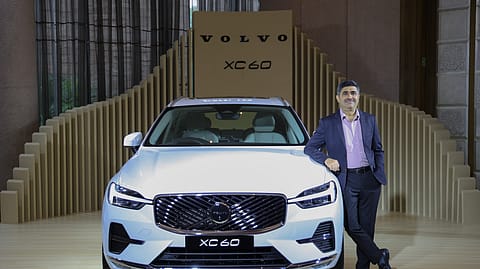Volvo Car India to bring plug-in hybrids if tax structure is eased: MD Jyoti Malhotra
Volvo Car India launched the Refreshed XC60 Mild Hybrid on Friday, at an introductory price of ₹71.90 lakh (ex-showroom).

Swedish luxury carmaker Volvo is open to bringing plug-in hybrid vehicles to India if the tax structure becomes favourable for hybrid vehicles, according to Jyoti Malhotra, managing director of Volvo Car India.
“To bring them (plug-in hybrids) here, we need to offer them at a price in which customers see value. Today, the tax structure is higher for hybrids. In my view, rightly so, because the government has made it very clear that they want pure electric cars. That is what we will focus on,” Malhotra told Fortune India in an interview.
“But if the government makes changes, we can always bring plug-in hybrids. But today, it doesn’t make sense to bring these to India,” he explained.
Volvo Car India launched the Refreshed XC60 Mild Hybrid on Friday, at an introductory price of ₹71.90 lakh (ex-showroom).
One in four cars sold by the Swedish luxury carmaker in India is an electric vehicle. “EV penetration in our portfolio is close to 25%,” said Malhotra. “Our direction is clear that we want to become an electric car company and that’s the road that we are taking. For India, one of the growth drivers is having more products,” he added.
Volvo currently sells XC90 and XC60 internal-combustion engine SUVs in the country, along with EC40 and EX40 fully-electric models.
On the enablers of EV adoption, Malhotra said home charging infrastructure is very critical. One of the key enablers for anyone to go for an electric car is a home charging solution, he said. “Home charging installation is not an easy task. In high-rise buildings, there are challenges. Every RWA (resident welfare association) will behave in a different way. Discoms will have to play a very important role there. If charging can be installed in a hassle-free way, that will enable the adoption of EVs,” he said.
“I know so many people who want to buy an EV, but just because they can’t have access to a personal home charger becomes a challenge,” Malhotra explained.
In Kerala, where most people have their own houses or bungalows, setting up home chargers is easy, and hence, the EV adoption is better, said Malhotra.
The Volvo Car India MD also urged states to follow a uniform road tax structure to promote EV adoption. “Road tax waivers are good. But the challenge is instability. You can bring it overnight and take it away overnight. Across the country, we should have a uniform road tax structure for EVs and maintain it for a longer period. That will really boost the EV adoption,” he said.
Speaking on the entry of Elon Musk-led Tesla to India, Malhotra said Volvo is focussing on strengthening its own offerings and not looking at anyone as competition. “India is a big country. Competition will come. Everybody is welcome,” he said.
(INR CR)
When asked about the government’s new EV manufacturing policy which slashes customs duty on electric cars with cost, insurance and freight value of $35,000 or more to 15% from the existing 100% if an automaker commits an investment of ₹4,150 crore, Malhotra said the scale of the luxury car industry in India is around 50,000 units annually. “Looking at the scale, I think CKD (completely knocked down kits) offers the best solution and we are continuing with that,” he said. Volvo assembles its BEVs in India.
Volvo, which has 23 showrooms in India, sold around 1,665 cars in the financial year 2024-25, down 22.5% compared with 2,149 units in the previous fiscal, according to data sourced from the Federation of Automobile Dealers Associations (FADA). The data does not include vehicles sold in Telangana.